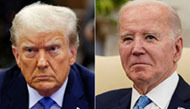▶ NEWS ANALYSIS
Pushing green energy, health insurance and broadband networks.
WASHINGTON
AS PRESIDENT OBAMA and Congress barrel toward the latest emergency program to resuscitate the American economy, one question is looming over their search for a cure: Can the government fashion a fast and efficient economic stimulus while also seizing the moment to remake America?
For now, Mr.Obama and his aides are insisting they can accomplish both goals, following their mantra of using the urgency of the economic crisis to accomplish larger - and long-delayed - reforms that never garnered sufficient votes in ordinary times.
In fact, at various times in American history, moments like this one have been used for big programs, from integrating the armed forces to creating Social Security and, later, Medicare. So it is little wonder that everyone with a big, stalled, transformative project - green energy programs, broadband networks that reach into rural America, health insurance for the newly unemployed or uninsured - is citing the precedent of Franklin D.Roosevelt, and declaring that a new New Deal is overdue.
But the question that the Senate has begun debating is whether grand ambitions are getting in the way of pulling the United States out of a downward spiral. And so for every comparison of this moment to
Roosevelt’s first hundred days, there are warnings that much of his social experimentation did not have a big impact on America’s economic recovery, which took years.
“When you are filling a hole this big and adding to America’s debt on such a large scale, you need to make sure every dollar is aimed for the economic boost you need,”said Martin S.Feldstein, a Harvard economist who warned more than a year ago that the United States economy was about to be hit.
Mr.Feldstein has provided the economic arguments behind Republican objections that Mr.Obama is starting a long-term expansion of government, after decades in which the United States has relied on market solutions and encouraged nations around the world to do the same.
Taken together, the economic stimulus plan and the banking bailout have quickly melded into a bitter political and ideological clash, barely two weeks into the Obama presidency. Some of what is going on might best be called a classic case of pent-up demand - demand by Democrats for the kinds of programs that they could never get passed during the Bush years.
After years of battling with a White House that questioned the science behind global warming, Democratic lawmakers see a chance to begin programs aimed at environmental protection, using economic justifications for efforts like developing low-emission cars. And with a Democrat in the White House, they also see an opening to push for increased spending on education.
The efforts are fueled by a liberal base that supported Mr.Obama’s promise that he would tackle the biggest issues. That same base is concerned that the long slog ahead will force a delay or an abandonment of those ambitions.
As a result, there is $54 billion in the House bill for new forms of“American energy,”a phrase with an air of nationalism, along with a series of“Buy America”requirements of dubious legality under trade treaties; $141 billion for education; $24 billion for lowering health care costs; and $6 billion for broadband service.
A piece of“emergency”legislation that would spend heavily to stanch the killing of jobs is now transforming into a series of long-term commitments that are sure to add enormously to the national debt, and keep adding to it long after the Panic of 2008 and the recession - or worse - that it set off are consigned to history.
In the Republican response to Mr.Obama’s address, Senator Mitch McConnell of Kentucky argued that“permanent spending would be expanded by about $240 billion”in the House, which would“lock in bigger and bigger deficits every year.”
Alice M.Rivlin, an economist at the Brookings Institution, an independent research and policy institute, and a former member of the Federal Reserve, supports a major stimulus package.“Because we’re doing this outside the budget process, it means no one has to talk about what the long-term effects of any of this might be,”she said. She testified recently in Congress about the need to separate short-term economic stimulus from a broader agenda - which embraces everything from fixing America’s schools to improving health care for children.
“We seem to be counting on the Chinese to keep investing to pay for this,”Ms.Rivlin said, referring to the huge amount of United States government debt held by China,“and we’re assuming that the rest of the world isn’t going to lose confidence once we use this moment to spend on a whole range of programs. And I’m just not sure that’s the right assumption.”
Ms.Rivlin raises what may turn out to be the most urgent question of all in a few months.
When Roosevelt took America down new roads, he financed it at home. Mr.Obama does not have that luxury: He must persuade not only the United States Congress and the public but also world financial markets, which must decide whether - and at what interest rate - they are willing to finance his plan.
That is the three-dimensional chess game the administration must play as it tries to mount the biggest economic rescue plan in more than seven decades.
스마터리빙
more [ 건강]
[ 건강]이제 혈관 건강도 챙기자!
[현대해운]우리 눈에 보이지 않기 때문에 혈관 건강을 챙기는 것은 결코 쉽지 않은데요. 여러분은 혈관 건강을 유지하기 위해 어떤 노력을 하시나요?
 [ 건강]
[ 건강]내 몸이 건강해지는 과일궁합
 [ 라이프]
[ 라이프]벌레야 물럿거라! 천연 해충제 만들기
 [ 건강]
[ 건강]혈압 낮추는데 좋은 식품
[현대해운]혈관 건강은 주로 노화가 진행되면서 지켜야 할 문제라고 인식되어 왔습니다. 최근 생활 패턴과 식생활의 변화로 혈관의 노화 진행이 빨라지고
사람·사람들
more많이 본 기사
- 트럼프와 여성들 함께 찍힌 ‘엡스타인 사진’ 공개
- 비극 속 시민의 용기 총격범 맨손 제압
- 지구촌 또 ‘총기 난사’… 미·호주 잇단 참사
- 인니 수마트라섬 ‘대홍수’
- ‘박성광♥’ 이솔이, 암 투병 중 안타까운 소식 “병원 몇 번 가는 건지..내 탓”
- 테슬라 11월 미국 판매… 4년만에 최저
- 19개주, 전문직 비자 ‘10만불 수수료’ 소송
- ‘김민재 점점 독일 국대에 밀린다’ 독일 현지, 타 향해 연일 찬사... “뮌헨 최고의 영입, 진정한 수비 리더”
- 변요한♥티파니, 약지에 ‘커플링·포르쉐’..열애 中 티냈다
- 뉴욕 백화점서 아기 기저귀 갈던 엄마, 정신질환자에 흉기피습
- 아이비리그 합격 가르는 것은 ‘스펙’ 아닌 ‘습관’
- 팝핀현준, 수업 중 발언 논란에 교수직 사임… “진심으로 사과”
- 시드니 유대인 총기참사 용의자는 50세 아버지·24세 아들
- 호주 총격범 제압 시민 영웅은 43세 과일가게 주인 아흐메드 씨
- 관세가 끌어올린 물가… 가구당 1,200달러 추가 지출
- 박나래 ‘링거이모’, 진짜 ‘無면허’였다 “박나래 알지만 전혀 기억 안 나”
- “성과는 있었지만 아직 끝 아냐”
- 항공기 승객정보 활용 추방 확대
- 오늘 추첨 파워볼 잭팟 11억달러로 ‘껑충’
- 총격 상처 피해 진학한 대학서 또 총기난사… “엄청난 타격”
- 모두가 원하는 물가 하락… 반드시 긍정적이지 않아
- 통계로 본 올해 대한항공… ‘캡틴 아메리카’ 가장 많이 보고, 최다 방문지 도쿄
- 정우성 “현빈과 텐션 점점 무르익어”…사생활 변화엔 “말씀 못 드려”
- [경제 트렌드] 외식비 줄이는 소비자… ‘팁 공포’ 한몫
- “걱정했잖아” 윤정수, 비 그친 발리서 ♥원진서와 신혼여행 만끽
- 연방법원, 킬마르 석방 “적법한 추방 명령 없어”
- 오늘의 베네수엘라가 내일의 동아시아국가…
- 연은 총재 전원 재임명 연준, 만장일치 표결
- 백악관 연회장 신축 저지 소송 국가역사보존단체, 연방지법에
- 미, 베네수엘라 지상전 위협… 쿠바까지 흔들기
- 중, 난징대학살 추도… ‘일본군 해골 베는 포스터’도
- 투고(To Go) 해야 하나?
- 남가주한인부동산협회, 송년모임 개최
- “마두로는 마약조직 총책”… 트럼프 속내는 석유 확보?
- [이민법 칼럼] 더 힘들어진 취업이민 1순위
- “스마트폰 달고 사는 당신, 안구건조증 주의하세요!”
- 퇴조의 핑크 타이드
- 연말 DUI 집중 단속 무관용 강력 처벌
- [조지 F. 윌 칼럼] 대통령의 전쟁수행권
- [만화경] ‘뒷마당’ 찾겠다는 트럼프식 먼로주의
- From Regret to Growth: A Morning of Reflection
- “트럼프, 바이든 데자뷔인줄” 취임 1년새 고령 논란·지지율 뚝
- 중국 ‘여행자제령’ 직격탄 맞은 일본
- ‘아연’의 효과… 올바르게 복용하면 감기 기간 줄일 수도
- 미 무역적자, 5년여 만에 최저
- 뿔난 불가리아 Z세대 총리 사임 ‘초유의 사태’
- 재정보조 테크닉보다 타이밍의 중요성
- 트럼프 관세 인하에도… 주요 식품 줄줄이 급등
- Engineering Hope When the World Pushes Back
- 트럼프, 새 연준의장 ‘2파전’ 시사
1/5지식톡

-
 테슬라 자동차 시트커버 장착
0
테슬라 자동차 시트커버 장착
0테슬라 시트커버, 사놓고 아직 못 씌우셨죠?장착이 생각보다 쉽지 않습니다.20년 경력 전문가에게 맡기세요 — 깔끔하고 딱 맞게 장착해드립니다!장착비용:앞좌석: $40뒷좌석: $60앞·뒷좌석 …
-
 식당용 부탄가스
0
식당용 부탄가스
0식당용 부탄가스 홀세일 합니다 로스앤젤레스 다운타운 픽업 가능 안녕 하세요?강아지 & 고양이 모든 애완동물 / 반려동물 식품 & 모든 애완동물/반려동물 관련 제품들 전문적으로 홀세일/취급하는 회사 입니다 100% …
-
 ACSL 국제 컴퓨터 과학 대회, …
0
ACSL 국제 컴퓨터 과학 대회, …
0웹사이트 : www.eduspot.co.kr 카카오톡 상담하기 : https://pf.kakao.com/_BEQWxb블로그 : https://blog.naver.com/eduspotmain안녕하세요, 에듀스팟입니다…
-
 바디프렌드 안마의자 창고 리퍼브 세…
0
바디프렌드 안마의자 창고 리퍼브 세…
0거의 새제품급 리퍼브 안마의자 대방출 한다고 합니다!8월 23일(토)…24일(일) 단 이틀!특가 판매가Famille: $500 ~ $1,000Falcon: $1,500 ~ $2,500픽업 & 배송직접 픽업 가능LA…
-
 바디프렌드 안마의자 창고 리퍼브 세…
0
바디프렌드 안마의자 창고 리퍼브 세…
0거의 새제품급 리퍼브 안마의자 대방출 한다고 합니다!8월 23일(토)…24일(일) 단 이틀!특가 판매가Famille: $500 ~ $1,000Falcon: $1,500 ~ $2,500픽업 & 배송직접 픽업 가능LA…
케이타운 1번가
오피니언
 옥세철 논설위원
옥세철 논설위원오늘의 베네수엘라가 내일의 동아시아국가…

퇴조의 핑크 타이드
 조지 F·윌 워싱턴포스트 칼럼니스트
조지 F·윌 워싱턴포스트 칼럼니스트 [조지 F. 윌 칼럼] 대통령의 전쟁수행권
 조옥규 수필가
조옥규 수필가 투고(To Go) 해야 하나?
 신경립 / 서울경제
신경립 / 서울경제 [만화경] ‘뒷마당’ 찾겠다는 트럼프식 먼로주의

22기 LA평통 출범에 거는 기대

연말 시즌 사기·범죄 경계해야
 메건 매카들 워싱턴포스트 칼럼니스트
메건 매카들 워싱턴포스트 칼럼니스트 [메건 매카들 칼럼] 장편영화의 마지막 챕터인가
 김미선 서북미문인협회 회장시인
김미선 서북미문인협회 회장시인 [한국춘추] 하늘을 계산한 사람들, 칠정산
1/3지사별 뉴스

“마약밀매·인신매매 등 국제범죄 척결” ‘국토안보 태스크포스’ 뉴욕지부 출범
연방 국토안보부가 10일 ‘국토안보 태스크포스’(HSTF) 뉴욕지부를 출범시켰다.HSTF는 마약 카르텔, 인신매매, 자금세탁, 갱단 등 국제범…
‘오바마케어 보조금’ 올해 말 종료 가능성 ↑ 커져

한국 교사 10명, 페어팩스 초등교 배치
‘글로벌 앰버서더 티처스 프로그램’(Global Ambassador Teachers Program)은 국제 교사 교환 프로그램 가운데 하나로 …
김찬수씨, 포토맥 포럼에 2천달러 기부

총격 상처 피해 진학한 대학서 또 총기난사… “엄청난 타격”
고교 총격 사건 생존자인 미아 트레타가 브라운대 총격 사건 이후 인터뷰하는 모습. [로이터]동부 브라운대에서 총격 사건으로 10여명의 사상자가…
내년 중간선거 낙관못하는 트럼프… “경제성과 전달에 시간 걸려”

오늘 하루 이 창 열지 않음 닫기 





















































.png)


댓글 안에 당신의 성숙함도 담아 주세요.
'오늘의 한마디'는 기사에 대하여 자신의 생각을 말하고 남의 생각을 들으며 서로 다양한 의견을 나누는 공간입니다. 그러나 간혹 불건전한 내용을 올리시는 분들이 계셔서 건전한 인터넷문화 정착을 위해 아래와 같은 운영원칙을 적용합니다.
자체 모니터링을 통해 아래에 해당하는 내용이 포함된 댓글이 발견되면 예고없이 삭제 조치를 하겠습니다.
불건전한 댓글을 올리거나, 이름에 비속어 및 상대방의 불쾌감을 주는 단어를 사용, 유명인 또는 특정 일반인을 사칭하는 경우 이용에 대한 차단 제재를 받을 수 있습니다. 차단될 경우, 일주일간 댓글을 달수 없게 됩니다.
명예훼손, 개인정보 유출, 욕설 등 법률에 위반되는 댓글은 관계 법령에 의거 민형사상 처벌을 받을 수 있으니 이용에 주의를 부탁드립니다.
Close
x